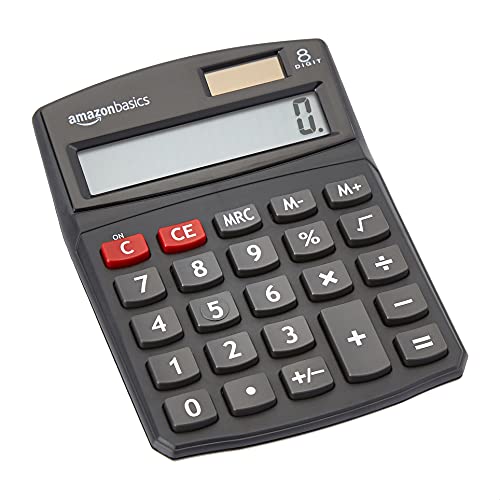Top & Best Calculator for Probability Problems — Comparison Table
| Image | Product | Key Features | Price | CTA |
|---|---|---|---|---|
 |
CATIGA Scientific Calculator with |
|
39.99 | Check price on Amazon |
 |
Amazon Basics LCD 8-Digit |
|
7.1 | Check price on Amazon |
Top 2 Best Calculator for Probability Problems
1. CATIGA Scientific Calculator with

The CATIGA Scientific Calculator is designed for both beginners and advanced users, featuring a graphic function that displays charts of formulas. With a large screen to view calculations and corrections simultaneously, it is perfect for various math courses. It offers over 360 functions, making it versatile for different subjects. A reset button is included for troubleshooting, and a 365-day warranty ensures customer satisfaction. Scientific Calculator with Graphic Function Multiple modes for different calculations Over 360 functions including complex numbers and statistics
Key Features
- Scientific Calculator with Graphic Function
- Multiple modes for different calculations
- Over 360 functions including complex numbers and statistics
Pros
- Versatile with many functions
- Large display for easy viewing
- Suitable for various math courses
Cons
- May be complex for absolute beginners
- Requires some learning to utilize all features
Best for: Students and professionals in advanced math courses.
Why buy: This calculator offers a comprehensive set of functions for serious math students. Its graphic capabilities help visualize complex problems effectively.
2. Amazon Basics LCD 8-Digit

The Amazon Basics LCD Desktop Calculator is a simple yet effective tool for basic calculations. With an 8-digit LCD display, it provides clear output for effortless viewing. It features essential functions like addition, subtraction, multiplication, and division, making it user-friendly for all ages. Its flat design ensures convenient access on any surface. 8-digit LCD for clear viewing 6 essential functions for basic calculations User-friendly buttons for all ages
Key Features
- 8-digit LCD for clear viewing
- 6 essential functions for basic calculations
- User-friendly buttons for all ages
Pros
- Affordable and easy to use
- Compact design for convenient storage
- Durable and reliable for everyday tasks
Cons
- Limited to basic functions
- Not suitable for advanced calculations
Best for: Casual users needing basic calculation functions.
Why buy: This calculator is perfect for everyday use and simple calculations. Its affordability and ease of use make it a great choice for all ages.
Buying Guide: Choosing the Best Calculator for Probability Problems
When selecting a calculator for probability problems, consider the type of functions you need. Scientific calculators are ideal for students and professionals who require advanced mathematical operations, including statistical functions. Look for calculators that offer features such as graphing capabilities, which allow you to visualize data and understand probability distributions better. Additionally, ensure that the calculator has a clear display for easy reading of complex equations and results. For those who are just starting with probability, a basic scientific calculator with essential functions may suffice, while more experienced users might benefit from advanced models that support a wider range of calculations.
Another important factor to consider is the user interface. A calculator with an intuitive layout and well-marked buttons can significantly enhance your experience, especially during high-pressure situations like exams or project deadlines. Ergonomics also play a role; a calculator that fits comfortably in your hand and is easy to operate can save you time and frustration. Furthermore, consider the portability of the calculator if you plan to carry it around for classes or meetings. Compact models that fit easily in a backpack or purse are often the most convenient.
Lastly, check for additional features that may be beneficial, such as memory functions, which allow you to store and recall previous calculations. Some calculators also come with built-in tutorials or guides to help you navigate through complex functions, making them suitable for learners. Warranty and customer support are also crucial; a reliable brand will offer assistance if you encounter any issues. By evaluating these factors, you can choose the right calculator that meets your needs for solving probability problems effectively.
Prepare the surface well: clean, fill dents, sand lightly, and use a bonding primer where needed. Good prep is 70% of the result.
Choose the right finish for the room: matte hides flaws, satin balances look/durability, semi-gloss is most wipeable for kitchens/baths.
FAQs
What features should I look for in a calculator for probability?
Look for scientific calculators with statistical functions, graphing capabilities, and a clear display for complex calculations.
Are scientific calculators necessary for probability problems?
While not mandatory, scientific calculators offer advanced features that can simplify complex probability calculations.
Can I use a basic calculator for probability problems?
A basic calculator may suffice for simple probability calculations, but advanced problems often require scientific or graphing calculators.
How portable should my calculator be?
If you plan to carry it frequently, opt for a compact model that fits easily in your bag without sacrificing functionality.
Is warranty important when buying a calculator?
Yes, a warranty ensures that you have support in case of defects or issues, providing peace of mind with your purchase.
Conclusion
Choosing the right calculator for probability problems can significantly impact your ability to solve complex equations and analyze data effectively. Whether you are a student or a professional, the calculators highlighted in this roundup offer a range of features tailored to different skill levels and requirements. From advanced scientific calculators with graphing capabilities to simple desktop models for everyday use, there is a perfect option for everyone. By considering factors such as functionality, user interface, and portability, you can select a calculator that not only meets your current needs but also supports your growth in understanding probability concepts. Equip yourself with the right tools, and tackle your probability problems with confidence.
Disclosure: As an Amazon Associate we earn from qualifying purchases. Prices change frequently; confirm on Amazon.
